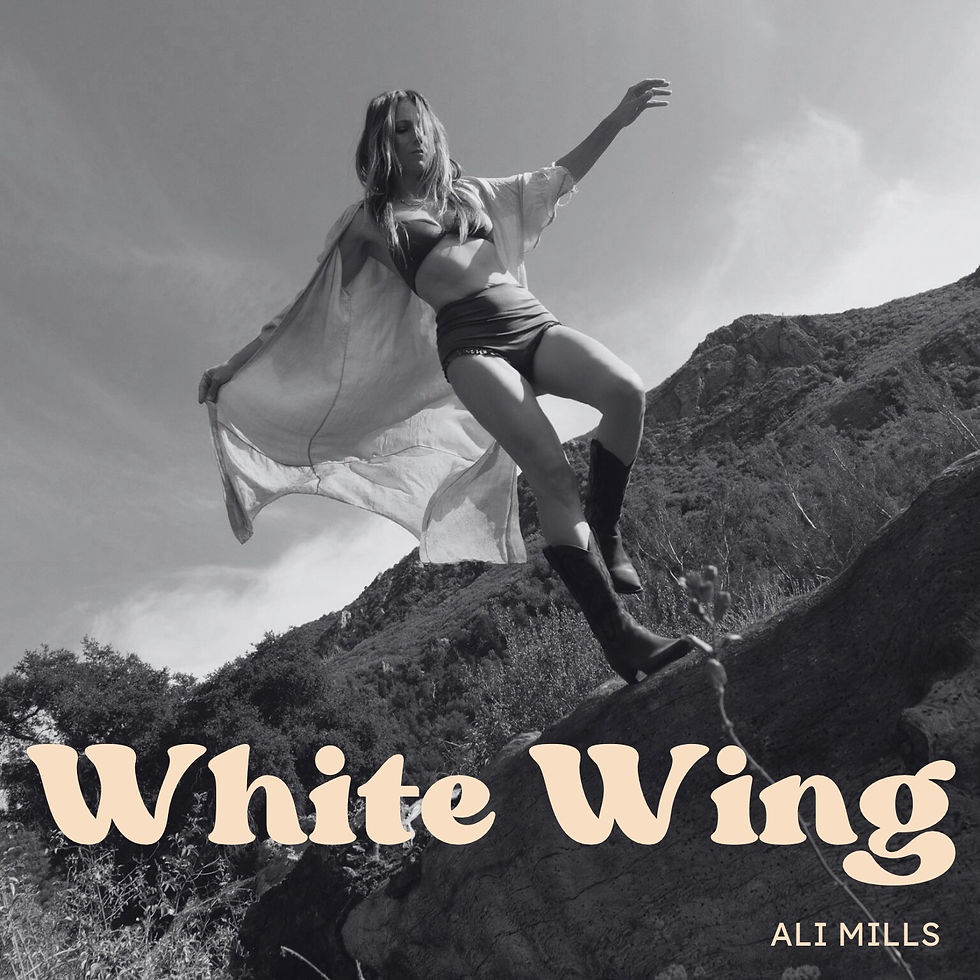White Wing: Ali Mills Confronts Desire in the Silence of the Night.
- Editorial Board

- Aug 19, 2025
- 3 min read
Ali Mills delivers a slow-burning confession of forbidden love, born under the gaze of a white barn owl.

Some songs arrive like a flash of neon. Others emerge like a candle flickering in the dark, soft, steady, transformative. Ali Mills’ new single “White Wing” is the latter: a rapturous slow-burner that stares directly into one of life’s most uncomfortable truths, our longing for what we cannot have.
The seed of White Wing was planted on a night hike in Los Angeles. Ali and a friend stumbled into the path of a white barn owl, its wings cutting through silence, its stare unflinching. Owls have long stood as symbols of wisdom, hidden knowledge, and spirituality. That encounter became more than just an omen. It turned into a mirror. Questions of purpose, relationships, and the weight of desire surfaced in that moment of stillness. From there, a song was born.
Lyrically, White Wing inhabits the space between confession and restraint. It is a narrative built around forbidden love, that universal ache for someone who can never be yours. Instead of dressing it up in metaphor alone, Ali leans into direct vulnerability. She admits the unspoken: the ache, the pull, the fire that burns when boundaries exist. This honesty makes White Wing more than a love song. It is an act of emotional exposure.
Produced and engineered by Steve McCormick and Ali herself, the record carries a deliberate patience. Jimmy Paxson’s half-time drums provide a heartbeat, steady, alive, never rushed. Ricky Cortes’ bass grounds the track with a slow pulse, anchoring it in weight and gravity. The interwoven guitars (Ali, Dylan Salfer, and McCormick) glide between atmosphere and melody, mimicking wings in flight. Steve McCormick’s organ spreads warmth like a halo, while Heather Donovan’s backing vocals emerge like distant echoes of conscience, ghostly and persuasive, impossible to ignore.
Mixed by Ali, McCormick, and Kevin Smith, and mastered by Gavin Lurssen, the sonics feel wide and cinematic. Every layer lingers in the air, like the owl’s silent wings beating above your head.
Ali’s vocal performance is where White Wing fully lives. She does not belt for effect, she aches with intent. Her tone carries restraint, almost trembling at times, but it is that very fragility that cuts deepest. When she leans into desire, you feel her giving away more than she intended. It is the sound of truth cracking through the skin.
The choice of the title White Wing is perfect. It draws from the encounter with the owl, but it also universalizes the metaphor. White wings are purity, wisdom, and transcendence, but here they are stained with longing. The imagery carries double weight. It is about the flight toward something greater, but also the reminder that what soars above us often stays out of reach.
Goathead has always been drawn to the work that sits on the fault line between raw honesty and crafted artistry. White Wing belongs here because it is not just polished, it is lived in. Ali did not write this to chase playlists, she wrote it because the encounter demanded it. That is the type of music that lasts, the kind that is not afraid of silence, longing, or truth.
White Wing is more than a single, it is a spiritual moment translated into melody. It is the sound of desire circling like an owl overhead, silent, inevitable, haunting. Ali Mills has crafted a track that does not scream for attention but demands you stop and listen. And when you do, you will hear yourself in it, the yearning, the regret, the beauty of wanting what you cannot hold.


